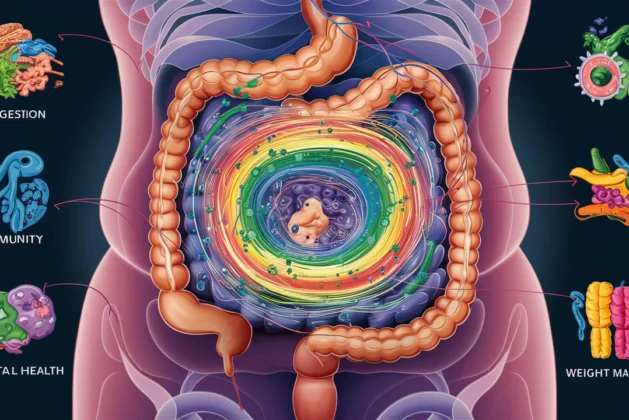You’ve probably heard about gut health a lot lately. But have you ever wondered what’s actually going on inside your digestive system? Well, behind the scenes of your stomach and intestines, a whole universe of tiny creatures—bacteria, fungi, viruses, and even archaea—are living and working together in a vast ecosystem known as your microbiome. And it’s not just there for kicks. These microscopic residents play a major role in everything from digestion to immune function, and even mood regulation. Let’s dive into how this invisible, bustling world impacts your health and why keeping it happy is more important than you think.
Table of Contents
What is the Microbiome?
Imagine your gut as a giant, bustling city, where the microbiome is the population of tiny inhabitants who keep everything running smoothly. This collection of microorganisms (which includes trillions of bacteria) is crucial to your overall well-being. In fact, the number of microbial cells in your body actually outnumbers your human cells—yes, you’re outnumbered by creatures you can’t even see!
While the gut microbiome is the most well-known, it’s not the only place in the body where these microbes live. Your skin, mouth, nose, and even the lungs are home to smaller communities of these microorganisms. Together, they form a highly complex ecosystem, influencing everything from digestion and metabolism to your immune system, mental health, and even the likelihood of developing chronic diseases.
The Microbiome’s Role in Digestion
Let’s talk digestion—because, well, you eat food and it has to go somewhere, right? The microbiome plays a crucial role in breaking down food that your stomach and small intestine can’t handle. Fiber, for example, is one of those tricky nutrients. Your digestive system can’t break it down on its own, but guess who can? The microbiota!
These tiny helpers ferment fiber into short-chain fatty acids that provide fuel for your gut cells. They also help with absorbing certain nutrients and producing vitamins like B and K. So, when people say, “Eat your veggies,” they’re not just thinking about your waistline—they’re thinking about feeding your microbial friends, too.
The Immune System Connection
You might think of your immune system as a battalion of defense mechanisms, like a series of walls, soldiers, and alarm systems guarding your body from invaders. But guess what? Your microbiome is in on the action too. A healthy microbiome is like an army of good bacteria that trains your immune system to distinguish between harmful pathogens and harmless substances.
In fact, over 70% of your immune system resides in the gut. It’s here that your microbiome helps keep the balance, ensuring that your immune system doesn’t get too overzealous (which can lead to autoimmune disorders) or too laid-back (which can make you more susceptible to infections). It’s like having a personal bodyguard that only lets the real threats into your system.
Mental Health and the Gut-Brain Connection
Now, here’s where things get really interesting—your microbiome isn’t just affecting your body, it’s also influencing your brain. That’s right: what’s going on in your gut could be affecting your mood, stress levels, and even mental clarity.
The gut-brain axis is a communication pathway between your digestive system and your brain. Signals from the microbiome can travel through the vagus nerve to your brain, potentially influencing the release of neurotransmitters like serotonin (which regulates mood). So, if you’ve ever heard someone say, “Trust your gut,” it might not just be a figure of speech—they might be onto something!
Recent research has even suggested that imbalances in the microbiome could be linked to mental health disorders like anxiety, depression, and even conditions like autism. This doesn’t mean the microbiome is solely responsible for mental health issues, but it certainly has a hand in the process. Talk about a gut feeling!
How to Keep Your Microbiome Happy
So now that we’ve established that your microbiome is basically running the show, let’s talk about how to keep it in tip-top shape. Fortunately, there are plenty of ways you can support this ecosystem of microorganisms:
- Eat a diverse, fiber-rich diet: The more variety in your food, the more variety in your microbiome. Aim for a mix of fruits, vegetables, whole grains, and legumes. Fiber is a big win for those gut bacteria!
- Probiotics and fermented foods: Think of probiotics as the “good guys” that help maintain a healthy microbiome. Fermented foods like yogurt, kimchi, sauerkraut, and kombucha are packed with live bacteria that can help bolster your gut’s ecosystem.
- Prebiotics are important too: Prebiotics are non-digestible foods (mainly fiber) that feed the beneficial bacteria in your gut. Garlic, onions, bananas, and asparagus are excellent prebiotic sources. It’s like giving your microbiome a buffet.
- Limit sugar and processed foods: Bad news, folks—those sugary snacks and processed foods aren’t just bad for your waistline, they can also upset the balance of your microbiome. High sugar and unhealthy fats feed harmful bacteria, so your friendly microbes might get pushed out.
- Avoid unnecessary antibiotics: While antibiotics are essential for fighting infections, overuse can disrupt your microbiome, killing both good and bad bacteria. Always follow your doctor’s instructions and avoid taking antibiotics when they aren’t necessary.
When Things Go Wrong: Dysbiosis
If your microbiome gets out of whack, this can lead to a condition known as dysbiosis, which means an imbalance between the good and bad bacteria. Dysbiosis has been linked to a variety of conditions, including gastrointestinal disorders (like IBS), skin problems (like eczema), autoimmune diseases, and even mental health conditions.
Signs that your microbiome might be in trouble include bloating, indigestion, skin flare-ups, and even brain fog. If you’re noticing any of these symptoms, it might be a sign that your microbiome needs a little TLC.
Conclusion: A Happy Microbiome = A Happy You
The bottom line is that your microbiome is a key player in your overall health. Whether it’s supporting your digestion, boosting your immune system, or even affecting your mood, these tiny microbes are far from insignificant. So, show your microbiome some love by feeding it the right foods, avoiding things that upset it, and keeping an eye on your health.
And remember: when in doubt, trust your gut. After all, it’s a lot smarter (and more powerful) than you think.
Read More: The Neuroscience of Anxiety Attacks: How Your Brain Triggers Fear and How to Overcome It




